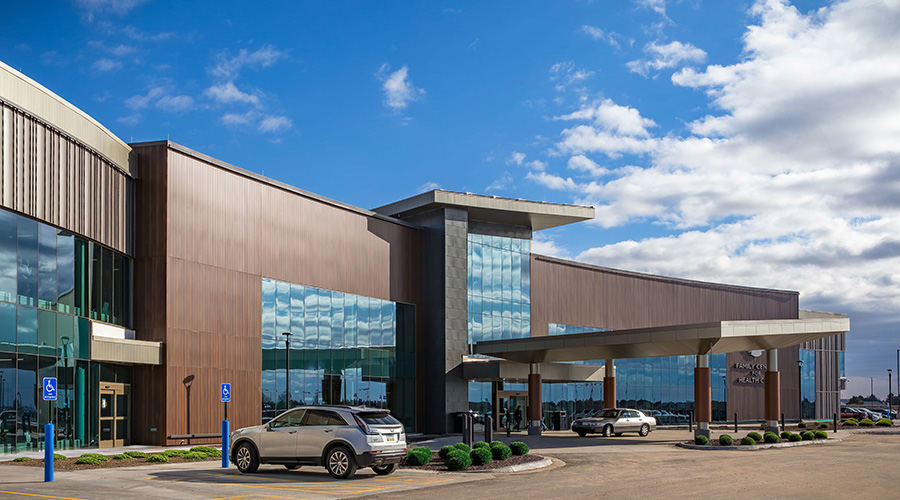Responding to the needs of healthcare facilities to prevent healthcare-associated infections (HAIs), Kenall Manufacturing today introduced a new line of Indigo-Clean™ light fixtures specifically designed for operating rooms. Indigo-Clean™ operating room (OR) light fixtures provide bright, high-quality, white light to illuminate the surgical field, while continuously disinfecting the environment. The announcement was made at the Association for Professionals in Infection Control and Epidemiology (APIC) Spring Academy being held this week in San Diego.
Like the original Indigo-Clean™ fixture that installs easily into the ceiling of any room, the OR version uses light-emitting diodes (LEDs) to generate visible white light that also contains a narrow spectrum of indigo colored light. This indigo color uses a wavelength of 405 nanometers (nm) to automatically, safely and continuously disinfect the air and both hard and soft surfaces. The 405nm light is absorbed by molecules within bacteria, producing a chemical reaction that kills the bacteria from the inside as if common household bleach had been released within the bacterial cells. When the OR is not being used, the lights can be switched to an Indigo-only mode, providing a higher degree of safe disinfection.
“Operating rooms represent one of the biggest challenges because of the procedures being performed, the frequent use of the facilities and the patients’ compromised immune systems,” said Cliff Yahnke, Ph.D., Kenall’s Director of Clinical Affairs for Indigo-Clean™. “Indigo-Clean™ has proven itself in clinical studies as an effective, automatic and continuous environmental disinfection tool — one that can provide a safer environment for surgical patients. A Wisconsin hospital recently documented a 70 percent reduction in bioburden in a trial of a room lit with Indigo-Clean™ fixtures.”
According to the Centers for Disease Control and Prevention (CDC), on any given day, around 1 in every 25 U.S. hospital patients contracts an infection in a health care setting. A CDC survey estimates that 75,000 hospital patients with hospital-acquired infections died during their hospitalization in 2011, and nearly one fourth (157,500 patients) developed infections from surgeries. Increased prevalence of antibiotic-resistant bacteria is estimated to kill up to 99,000 Americans and infect another 1.7 million each year.
“As an innovator in healthcare lighting and a leader in LED lighting, we are excited to bring healthcare providers this effective, revolutionary environmental disinfection tool to bolster current cleaning methods, providing a safer environment for their patients,” said Yahnke. “We look forward to seeing Indigo-Clean’s™ presence in hospitals grow as healthcare providers continue to realize its benefits.”
Earlier this year, the independent ECRI Institute included Indigo-Clean™ on its list of top 10 technologies that healthcare executives should watch in 2016. The light fixture also recently won the Specialty Solid State Lighting (SSL) Design award at the LEDs Magazine Sapphire Awards.
Clinical evaluations of the technology have been underway at several U.S. hospitals to document the effectiveness of Indigo-Clean™. Froedtert and the Medical College of Wisconsin, Froedtert Hospital in Milwaukee recently completed two evaluations of the technology in their Gastroenterology (GI) Clinic’s waiting room.
“During the first phase of our study, where we initially validated the lighting, we saw approximately a 40 percent reduction in bioburden,” said Dr. Nathan Ledeboer, Associate Professor of Pathology at the Medical College of Wisconsin. “However, in Phase 2 of the trial, where the lighting deployment was optimized across the room, we were able to improve the bioburden reduction to more than 70 percent.”
Similar evaluations in patient rooms are underway at United Hospital System, Kenosha Medical Center Campus. Hospitals in Pennsylvania, Tennessee, Nevada and New Jersey will soon begin conducting their own Indigo-Clean™ evaluations.
“Indigo-Clean’s™ ability to continuously kill harmful bacteria on hard and soft surfaces bolsters the healthcare facility's cleaning efforts,” said Yahnke. “Unlike other systems that require the room to be taken out of service and/or activated by a trained operator, Indigo-Clean™ is safe and automatic which minimizes human error and room downtime. These benefits are especially important for today’s Operating Room environment with its stringent hygienic standards and fast turn-around times.”
The Indigo-Clean™ technology was discovered in 2002 by researchers at Scotland’s University of Strathclyde and has been clinically proven to reduce harmful bacteria up to 70 percent beyond routine disinfection efforts. It was first used in 2008 to reduce bacteria linked to hospital-acquired infections at the Glasgow Royal Infirmary, a major teaching hospital in the U.K., and has been the subject of more than 30 peer-reviewed journals and conference presentations. The University was granted the U.S. patent on the technology in 2013 and selected Kenall as the exclusive licensee to commercialize it for the North American healthcare market.
Indigo-Clean™ is available in three configurations, including a Mixed mode (white and 405nm LEDs), Indigo-Only and a Switchable White and Indigo LED, which allows users to conveniently optimize the level of disinfection based upon room occupancy. For additional information, visit www.Indigo-Clean.com, Facebook or Twitter or call (800) 4-KENALL.
For additional information on Indigo-Clean, visit www.indigo-clean.com.

 Assisted Living Facility Violated Safety Standards: OSHA
Assisted Living Facility Violated Safety Standards: OSHA McCarthy Completes Construction of Citizens Health Hospital in Kansas
McCarthy Completes Construction of Citizens Health Hospital in Kansas California Tower at UC Davis Health Topped Out
California Tower at UC Davis Health Topped Out What 'Light' Daily Cleaning of Patient Rooms Misses
What 'Light' Daily Cleaning of Patient Rooms Misses Sprinkler Compliance: Navigating Code Mandates, Renovation Triggers and Patient Safety
Sprinkler Compliance: Navigating Code Mandates, Renovation Triggers and Patient Safety